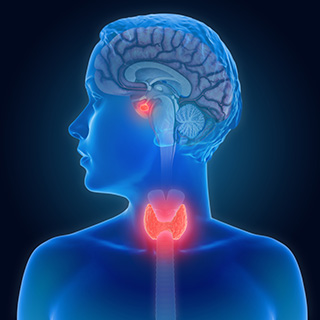1. Causes of Endocrine disorder
Endocrine disorders occur due to problems of endocrine glands. Of multiple endocrine dysfunction, the most common are those related to pancreas or thyroid glands, pituitary glands or adrenal glands.
Causes and types of endocrine disorders include:
– Acromegaly – overproduction of growth hormone and prolactin;
– Addison’s disease and Cushing’s syndrome – refers to changing levels of hormones produced by the adrenal glands;
– Diabetes – occurs when the pancreas does not produce enough insulin or when the body does not respond properly to insulin;
– Environmental or nutritional factors – such as lack of iodine common in hypothyroidism, which can affect hormone production;
– Genetic factors – which plays an important role in endocrine disruption especially if diabetes but also in autoimmune thyroiditis or Hashimoto thyroiditis, hyperthyroidism, hypothyroidism, Graves’ disease;
– Presence of tumors – because of underlying endocrine disorders may be related to growth of a tumor of a gland.
2. Risk factors for endocrine disorders
Several risk factors increase the likelihood of developing endocrine disorders. Not everyone in which they are presented will have endocrine imbalances.
Risk factors for endocrine disruption include:
– High cholesterol;
– A medical family history of endocrine disorders;
– Inactivity;
– Personal medical history of autoimmune disease;
– Inadequate diet;
– Pregnancy;
– Recent surgery, trauma, infection or serious injury.
3. Reducing the risk of endocrine disorders
Although many endocrine disorders can be inherited or occur for unknown reasons, some of which may be related to habits of daily life that can be changed.
A person may help lower the risk triggering certain endocrine disorders with a healthy diet and a healthy lifestyle that includes regular physical activity.
4. Treatment of endocrine disorders
In many cases, endocrine disruption events may not involve or imply the presence of mild symptoms that do not require treatment.
However, in some situations it may be necessary to correct hormonal imbalance by administering synthetic hormones or may be useful including surgery or radiotherapy. Diagnosing and treating the underlying cause of the endocrine disorder will improve the symptoms.
5. Complications of endocrine disorders
Although most are minor endocrine imbalances and their progress is slow, certain endocrine disorders can cause complications over time, which can affect the body’s normal processes. In cases in which the patient suffers from diabetes, Addison’s disease and hypothyroidism, in particular, serious complications may result.
Complications of untreated or poorly controlled endocrine imbalances can be quite serious and may endanger a person’s life. Serious consequences risk can be minimized by following the recommended medical regimen. Among some of the complications of endocrine disorders are listed:
– Anxiety or insomnia;
– Coma;
– Depression;
– Cardiovascular disease;
– Nerve damage;
– Damage or organ failure;
– Poor quality of life.














